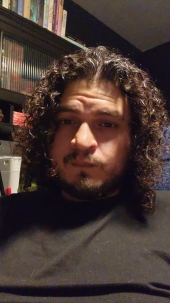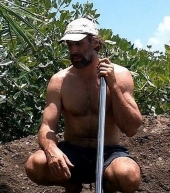




 10
10




Charlotte Tessadri wrote:Hi guys,
So what I was wondering about is the following:
What is a scientist for you?
The pdc is for scientist and so on, but what exactly does it mean?
Philosophically spoken anyone who is interested in science, seeking to find the truth behind natural phenomena could be a scientist.
But practically spoken there's different forms of science, some say only nature science are real science.
Others would say a real scientist starts at the phd level, bachelor and masters are only wanna - be - scientists.
So what's your opinion about it
Also important for me to know if I can call myself a scientist or not. 😆
Thanks
Executive Director and Lead Instructor, Institute of Integrated Regenerative Design
 2
2




Projects, plans, resources - now on the Permies.com digital marketplace.
Try the Everything Combo as a reference guide.
 1
1




 1
1




Permaculture...picking the lock back to Eden since 1978.
Pics of my Forest Garden
 1
1




Charlotte Tessadri wrote:Thank you for this detailed and very deep answer to my question. I'm really impressed and thankful for the package of knowledge you just gave me. I am really wondering how it would be to talk to you for real. :-)
And I have to say I'm also very happy about your answer. I like to call myself a scientist because I love to observe and I also love the challenge to break my boundaries and search for the unknown or let's say renew old, dusty paradigms.
I'm very much into the science of yoga which is a very old and mostly misinterpreted science about how we perceive our reality. I believe that yogis were the first indian scientists, who included much more in their observations than modern scientist do today. That's why they might have gone much deeper as we go today.
Studying yoga deeply definitely redefines your view of human capacities and practicing it truly extends yours and the capacities of your surrounding for sure.
Please forgive me my English, it's a bit late now and my brain is tired. 😊
Anyway thank you for the answer.
I'm still a bit curious tough:
I studied educational science and I am very much interested in pedagogical concepts that educators use to teach people.
Can you tell me a bit about your approach of teaching permaculture and also your way of teaching to teach permaculture. 😊
How do you think can and will people sustainably learn and which methods to you use to support them in your courses?
Looking forward to another great answer
Thanks
Executive Director and Lead Instructor, Institute of Integrated Regenerative Design
 1
1




Greg Martin wrote:I kind of look at it as....when one is using the scientific method one is acting as a scientist. You can be a professional scientist, an amateur scientist, have a doctorate in a science, have a bachelor's degree or be a high school drop out. Those are just extra titles to characterize the folks, but I think someone is only a scientist when they are doing science. Don't get me wrong, some people are better at it than others....some much better. And peer review is a critical part of the process. Without peer review it gets dicey fast because it's much too easy to fail due to our unexamined biases. Peer review isn't perfect, but it certainly tends to help.
Executive Director and Lead Instructor, Institute of Integrated Regenerative Design
 1
1
 1
1








 5
5




julian Gerona wrote:Scientist have protocols and guidelines to obey as thought in school.




Sebastian Köln wrote:If scientists would only stick to existing norms, new discoveries would be quite rare.
 3
3




Sebastian Köln wrote:
julian Gerona wrote:Scientist have protocols and guidelines to obey as thought in school.
I disagree. Yes for most things protocols have been developed to simplify things, but they are not binding. It is perfectly valid to run things different from the norm, assuming the process is documented.
If scientists would only stick to existing norms, new discoveries would be quite rare.
Projects, plans, resources - now on the Permies.com digital marketplace.
Try the Everything Combo as a reference guide.
 2
2




Country oriented nerd with primary interests in alternate energy in particular solar. Dabble in gardening, trees, cob, soil building and a host of others.








Charlotte Tessadri wrote:I think practicing permaculture is a great way to awaken the inner scientist in people, but I am not very strict with the word scientist. For me a scientist definitely is a person who wants to free themselves from the norms to discover the truth beyond the known. Old paradigms have to be changed or thrown out for something new to come. If you research within a discipline you already are caught in the concepts of that discipline, meaning you're already nit thinking freely, because the perspective you're researching from has been taught to you from someone else, who has also taken over concepts from another person.
Thus a scientist who has studied in his field for many years might not be as free as someone who has never studied anything before.
And I think to really observe something, perceive it purely it is better to have a free mind rather than a mind stuffed with various concepts.
Anyway: Alan, thank you for the response about the education techniques from the San people. I'm very fascinated now and I'm wondering why you have such a deep knowledge in that field. Did you live with them for some time?
Executive Director and Lead Instructor, Institute of Integrated Regenerative Design
 4
4




Examine your lifestyle, multiply it by 7.7 billion other ego-monkeys with similar desires and query whether that global impact is conscionable.




Jondo Almondo wrote:Quite a lot of scientific findings are profoundly counter-intuitive.
Wave-particle duality for instance isn't something that just anyone could notice, you need the foundational physics from which to build and an extremely specific experiment to illustrate it.
Our perception is derived from imperfect animal senses designed to survive the world, not understand it.
I find the science around things like confirmation-bias, optical illusions and the Dunning-Kruger effect make it easier to doubt the first-impression model our brains present us - which produces the humility necessary to investigate new ideas and be open-minded about abstract ones.
And the more times your intuition is proved wrong, the easier it is to entertain new theories.
For all the things said against academic orthodoxy, we wouldn't be having this discussion without it.
 4
4




Examine your lifestyle, multiply it by 7.7 billion other ego-monkeys with similar desires and query whether that global impact is conscionable.




What you described is the majority view of intuition.Jondo Almondo wrote:I think intuition usually fosters the opposite of innovation and too often we impose hypotheses on our intuited-designs after the fact and then revel in how 'clever' we are.

 2
2




Jondo Almondo wrote:I
When a farmer sees some plants growing poorly on hard-panned soil, its his intuition that tells him to repeatedly plow the soil.
.
 1
1




julian Gerona wrote:You are mistaking mind conditioning for intuition.





| I agree. Here's the link: http://stoves2.com |






